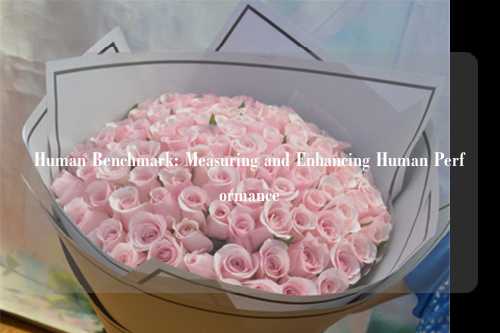Introduction
In an era where technology and artificial intelligence are rapidly advancing, the concept of benchmarking human capabilities has gained significant attention. Human Benchmark refers to the process of evaluating and quantifying human performance across various cognitive and physical domains. From reaction time tests to memory assessments, these benchmarks help individuals understand their strengths and weaknesses while striving for improvement.
This article explores the significance of Human Benchmark, the different types of tests available, their applications, and how individuals can use them to enhance their cognitive and physical abilities.

What is Human Benchmark?
Human Benchmark is a collection of standardized tests designed to measure different aspects of human performance. These tests can evaluate:
- Cognitive Abilities (memory, attention, problem-solving)
- Physical Performance (reaction time, coordination, endurance)
- Emotional Intelligence (empathy, stress management)
The results provide a baseline for comparison, allowing individuals to track progress over time or compare their performance against population averages.
Types of Human Benchmark Tests
Reaction Time Tests
Reaction time is a crucial measure of how quickly the brain processes stimuli and initiates a response. Simple online tests, such as clicking a button when a color changes, can assess this ability. Athletes, gamers, and drivers often train to improve reaction times for better performance.
Memory Tests
Memory benchmarks evaluate short-term and long-term recall. Common tests include:
- Digit Span – Remembering sequences of numbers.
- Visual Memory – Recalling patterns or images.
- Word Recall – Memorizing and repeating lists of words.
These tests are valuable for students, professionals, and older adults monitoring cognitive health.
Typing Speed and Accuracy
Typing benchmarks measure words per minute (WPM) and error rates. They are essential for data entry professionals, programmers, and writers seeking efficiency improvements.
Aim and Coordination Tests
These tests assess hand-eye coordination, often used by gamers, surgeons, and athletes. Examples include:
- Target clicking – Hitting moving targets quickly.
- Precision tasks – Drawing shapes or following patterns.
Problem-Solving and IQ Tests
Standardized IQ tests (e.g., Raven’s Matrices) evaluate logical reasoning, pattern recognition, and abstract thinking. While controversial, they provide insight into cognitive strengths.
Emotional and Stress Resilience Tests
Some benchmarks assess emotional intelligence (EQ) and stress management. These are useful in workplaces and personal development.
Why Human Benchmark Matters
Self-Improvement and Personal Growth
By identifying weaknesses, individuals can focus on targeted training. For example:
- A slow reaction time may prompt reflex exercises.
- Poor memory could lead to mnemonic training.
Professional and Athletic Performance
- Esports players optimize reaction times and precision.
- Students improve memory retention for exams.
- Corporate professionals enhance typing speed and problem-solving.
Health Monitoring
Cognitive benchmarks can detect early signs of decline, prompting medical intervention. Memory and reaction tests are used in neurology to assess conditions like dementia.
Human vs. Machine Comparison
As AI advances, benchmarking human abilities helps us understand where humans excel (creativity, empathy) and where machines outperform (speed, data processing).
How to Improve Your Human Benchmark Scores
Practice Consistently
- Reaction Time: Use apps like HumanBenchmark.com or play fast-paced games.
- Memory: Engage in puzzles (Sudoku, crosswords) or use spaced repetition techniques (Anki flashcards).
Physical Exercise
Cardio and strength training enhance brain function by improving blood flow and neuroplasticity.
Sleep and Nutrition
- Sleep is critical for memory consolidation and reaction speed.
- Omega-3s, antioxidants, and B vitamins support cognitive health.
Mindfulness and Stress Reduction
Meditation and breathing exercises improve focus and emotional resilience.
Cognitive Training Apps
- Lumosity – Brain-training games.
- Elevate – Focuses on language and math skills.
- Dual N-Back – Enhances working memory.
Limitations of Human Benchmarking
While useful, these tests have drawbacks:
- Situational Bias: Performance varies based on fatigue, mood, and environment.
- Overemphasis on Metrics: High scores don’t always translate to real-world success.
- Cultural and Educational Bias: Some tests favor individuals with specific backgrounds.
The Future of Human Benchmarking
Advancements in neuroscience and wearable technology will refine benchmarking:
- Brain-Computer Interfaces (BCIs) could measure neural efficiency.
- AI-Powered Personalization may tailor training programs based on individual data.
- Gamification will make cognitive training more engaging.
Conclusion
Human Benchmark provides a structured way to measure and enhance our abilities. Whether for personal growth, professional development, or health monitoring, these tests offer valuable insights. By leveraging consistent practice, proper health habits, and technology, individuals can push their limits and achieve peak performance.
In a world where machines are becoming smarter, understanding and optimizing human potential remains more important than ever. How will you benchmark yourself today?